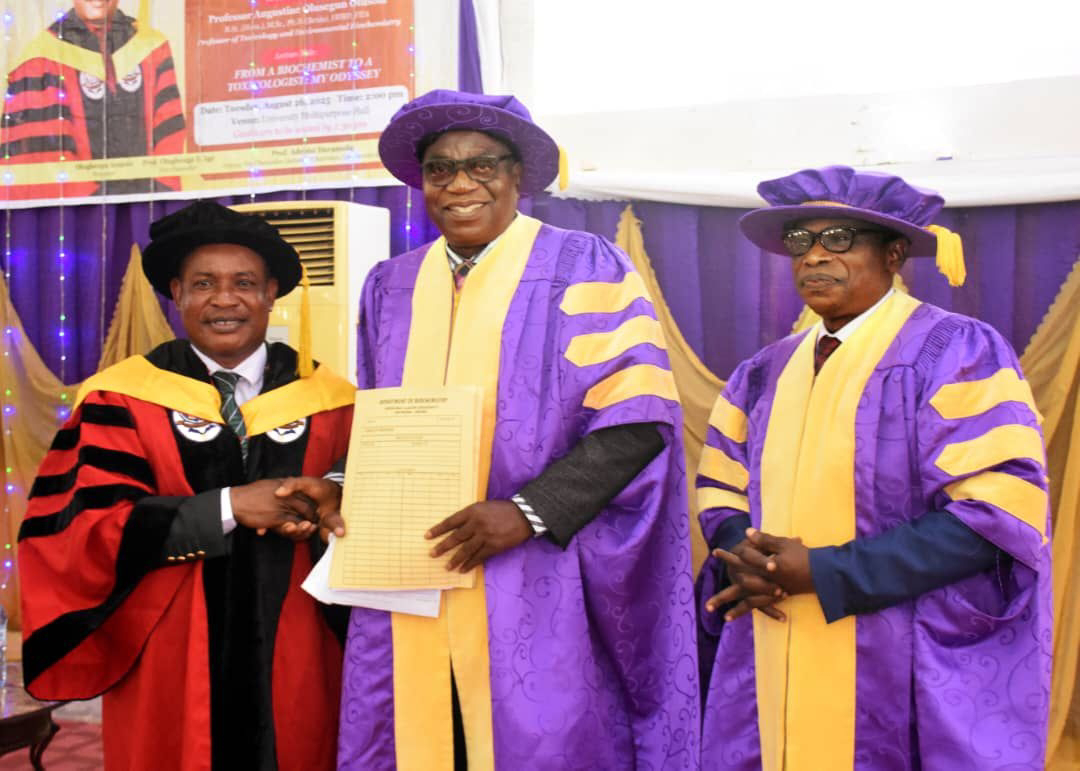Professor Augustine Olusola, a renowned expert in Toxicology and Environmental Biochemistry, has urged intensified efforts to tackle food adulteration, warning that the practice contributes to chronic illnesses affecting the liver, kidneys, blood, and reproductive organs.
He also praised the therapeutic potential of local herbs and called for their regulation and testing to match the standards applied to conventional medicines.
The professor made the call during the 46th Inaugural Lecture of Adekunle Ajasin University, Akungba-Akoko, on Tuesday, 26 August 2025.
His lecture, titled “From a Biochemist to a Toxicologist: My Odyssey,” examined the convergence of modern science and traditional medicine in addressing today’s health challenges.
To curb the increasing prevalence of adulterated food products, Prof. Olusola recommended a combination of stricter enforcement of food safety laws, enhanced public awareness, support for compliant producers, ongoing research, and stringent penalties for offenders.
He said, “Agencies like NAFDAC and SON must enhance surveillance in open markets, focusing on retail points where adulteration is prevalent.
“Awareness campaigns are also needed to empower consumers to identify adulterated products and understand associated health risks, while promoting direct purchases from reputable sources may reduce exposure and risks.”
He further noted, “Economic incentives and certification programmes for small-scale producers who adhere to safety standards could foster healthier market competition.
“Continued scientific investigation is equally needed to track trends, refine detection methods, and evaluate long-term health impacts, just as rigorous legal enforcement against offenders is essential to deter this dangerous practice.”
Highlighting the medicinal value of indigenous plants, Prof. Olusola drew attention to Clompanus pubescens, which has shown promise in managing diabetes.
According to him, “In the hands of indigenous healers, Clompanus pubescens has been used for fatigue, memory loss, and stress-symptoms that closely resemble those found in diabetic patients suffering from cognitive decline, a condition now recognised as diabetic encephalopathy.”
Laboratory studies, he explained, demonstrated that rats treated with the herb showed improved memory, learning ability, and a marked reduction in diabetes-related symptoms, underscoring its potential for scientific validation and broader therapeutic use.
Prof. Olusola stressed the need for a scientific approach to natural remedies, stating, “I advocate for a new scientific movement-one that tests, validates, and regulates natural compounds with the same rigour applied to synthetic drugs. This is especially critical in Nigeria, where natural products hold the key to low-cost, culturally accepted therapies. While conventional medicine undergoes rigorous testing, traditional remedies often bypass biochemical scrutiny.”
In his remarks, Professor Olugbenga Ige, Vice Chancellor of Adekunle Ajasin University and chairman of the event, praised Prof. Olusola for his significant contributions to research and society.
He noted that inaugural lectures serve as platforms for scholars to share findings that can benefit communities and advance scientific knowledge.









